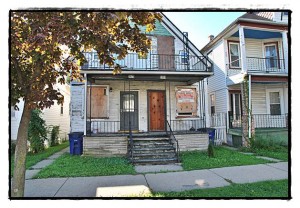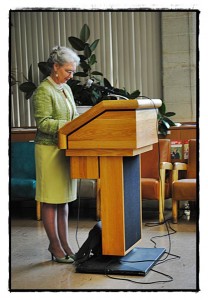A look back at the last half of 2011
By Charles Sercombe, Alan Madeleine and Ian Perrotta
Well, here it is, the second installment of our year in review. We’ve put together the highlights, as well as the lowlights of 2011. We’re interested in what you think of the past year. Give us a shout out at news@thethehamtramckreview.com.
JULY
Any hope that city officials had about American Axle & Manufacturing reopening its plants looked like a thing of the past.
In July, American Axle officials announced they were closing down the company’s last remaining active plant in February and would lay off 300 workers. Company officials said a change in the demand for parts was the reason work is stopping here.
But according to local media reports, the closing seemed to be more about forcing UAW members to take a pay and benefit cut from $45 an hour to $30 an hour.
UAW officials said their union agreed to reduce pay to $32 an hour, but American Axle officials said that was untrue.
Regardless, it’s clear where the parts production had shifted: To American Axle’s Mexico plant, which employs about 2,700 workers and is responsible for 28 percent of the company’s global income of $2.3 billion.
The average hourly rate for a Mexican plant worker is $6.94.
There are some houses in town that are pretty rundown, and then there was a certain house on the 2000 block of Edwin St., next door to a house owned by Tom Witkowski.
The house next door to his was literally filled with feces, or so said the Hamtramck police.
The person who occupied the house had the habit of defecating on his couch, floor or anywhere, apparently, but the toilet, said police investigators.
When the cops came to arrest the guy for income tax evasion, and possible child abuse, he was asked why there was so much excrement on the floor and everywhere.
The reason was not clear, but detectives said that the man who had been living there was obese and had a hard time getting around. According to Witkowski, he had noticed that numerous toilets were thrown out over the last few years since the man lived there.
The house was later condemned.
In an otherwise sleepy election year, a little drama erupted a month before the August Primary.
A question of residency arose about city council candidate Abu Mahfuz. Although he claimed to live in Hamtramck, the address he listed where he lived turned out to be an empty attic.
Or so it appeared.
The owner of the house said despite appearances, Mahfuz actually lived there. However, according to city rental dwelling records, the attic was not listed as a residence.
Then a new ripple emerged. According to the Secretary of State, Mahfuz had changed his address on July 1 and claimed to reside on Moran St.
No matter, he did not survive the cut in the Primary Election.
City Manager Bill Cooper decided to take on another job in the city. Instead of appointing someone in the Police Department as acting chief, Cooper took on the role.
That immediately led to a labor grievance. The job of chief became open when Chief Marek Kalinowski retired from the department.
Why in the heck did he appoint himself?
According to our sources within the department, there was a lot of division over who should be named chief, and that division turned into confrontation among some in the department to the point where things were getting a little out of control.
Cooper said that recent issues had come to light, and he wanted to get first-hand knowledge of what’s going on within the department.
“I felt I needed to be closer to the situation,” Cooper said.
Cooper remained acting chief until December.
The effort to boot Gov. Rick Snyder out of office came to town. Although it appears the recall drive is still far off, petition organizers said in July that they had no problem getting signatures.
Local recall organizer Chris Cornwell said many of the people signing the petition were well informed about Snyder’s budget proposal, especially something as obscure as cuts in state revenue funding to cities.
“One guy called it blackmail, that you can’t blackmail a city,” Cornwell said.
There were no knockout punches or game changing turns and twists at July’s “Meet the Candidates Night.”
But there were some enlightening moments and a few jabs, as well as a mother lode of information supplied by the nine city council candidates who elected to participate.
Four candidates did not show up. Some candidates apparently boycotted the event because The Review was a co-sponsor.
In this election, perhaps more so than in previous ones, the issue of residency had been the talk of town. Candidate Robert Zwolak was on the forefront of this issue, and he let loose a zinger.
“If you don’t live in this town, don’t run for council,” he said. And as for those who serve on council but are rumored to not live here, he said: “resign.”
A fierce July storm, that some likened to being a mini-tornado, struck down over a dozen trees in town. The city last experienced a storm near this caliber in 1997 when a full-fledged tornado hit town.
At that time, over 500 trees were lost.
Mayor Karen Majewski held her annual “State of the City Address” at the public library. The mayor spoke at length on a variety of topics. In a nutshell, the past year was full of ups and downs.
In the end, she had to pause and collect herself to remind the faithful that, “…despite everything that’s been thrown at us, we are still here … alive and kickin’… still Hamtramck.”
Hamtramck’s Post Office dodged another bullet.
The Postal Service announced in July that it was thinking about closing 3,700 postal branches throughout the country. Hamtramck was not on that list.
But there were several branches in the Detroit area on the list as well as Highland Park’s only branch.
Two years ago, postal authorities announced Hamtramck’s branch would be closed, but a public outcry from residents apparently did the trick in preventing that from happening.
At that time Russ Gordon of Zinow St. organized a petition drive to stop the closing. He handed postal officials a petition with 1,200 names. That apparently impressed postal authorities.
The poetry community here and in the metro area reeled in shock upon hearing that poet David Blair had died.
Blair had been particularly active in the Hamtramck’s poet circle. The cause of his death was not known.
It seemed only right that during the 50th anniversary of Hamtramck’s famed Little League World Championship, a group of Little Leaguers, in the Bronco division, won the Metro Area Championship.
In Hamtramck, baseball is still a game of champions.
It took some political pressure, and perhaps call in a few favors, but Wayne County finally did what taxpayers pay for, or at least part of what we pony up. The county mowed down an embankment along Conant near the viaduct.
The grass there had grown about four feet tall, making it not only unsightly, but also a potential safety hazard for an unwitting pedestrian to come along and get mugged.
A Hamtramck police officer assigned to work with a federal drug task force apparently was lured to the other side. Randall Hutchinson, 45, entered a guilty plea in federal court of tipping off a motorcycle gang member that the Drug Enforcement Agency was tapping his phone line.
The DEA had been investigating 90 members of the Highwaymen for dealing steroids and other criminal activities.
AUGUST
Everyone who lives in Hamtramck or visits here frequently knows this city is all about walking around.
And in August, the whole country knew as well, thanks to walkscore.com, which ranked Hamtramck as the Number One walkable city in the state.
Walk Score claimed that “one point… is worth up to $3,000 of value for your property.” Arguable, for sure, but it looked good in print, and that may be all that matters.
Hamtramck scored a 69 — ah, make up your own joke.
Despite the recent dominance of the Bangladeshi-American voting bloc, only two out of five Bengali candidates for city council made the cut for November’s election.
Incumbent candidate Cathie Ladzinski Gordon finished on top with 552 votes.
The total number of votes cast was 1,486, which is considered a light turnout for a Primary Election.
This election was likely off the radar of many potential voters because the only issue on the ballot was the council race. Some said that there were fewer Muslim voters because election day was the second day of Ramadan.
And speaking of the election, all of the candidates had one thing in common: They were all cheap when it came to campaign spending.
All but three of the 13 candidates who ran for the Primary Election filed a waiver with the Wayne County Election Division that said they didn’t plan to receive or spend over $1,000.
That waiver exempted them from having to file campaign financial reports.
Candidates Cathie Gordon, who was the only incumbent seeking re-election, Steve Shaya and Roger Lamm did not seek a financial waiver.
Shaya emerged as the big gun, at least financially speaking. His campaign war chest started out with $3,590, according to his pre-Primary Election report that was filed with Wayne County.
Gordon started her campaign with $2,847.
It was unknown at that point how much money Lamm came up with because his financial report had not yet been filed.
Just where does the money come from for these candidates? In the case of Shaya, largely from himself. He donated $2,800 to his campaign, according to his financial report.
Gordon’s war chest was partially fueled by $1,374 that she and her family members donated.
Hamtramck’s first-ever Farmer’s Market started out small, just like a seed, but it eventually blossomed into something a little more sizable.
It was the brainchild of Alex and Zina Lumelsky, who wanted to bring locally-grown fresh, and preferably organic, produce into town.
At the start, three growers agreed to set up a table every Wednesday in the city parking lot between Polonia and Polish Village Cafe.
There was one unexpected bump in the plan, however.
“This growing season has been pretty weird,” Alex said at the time. “We had no spring.”
As a result, he said, not a lot of produce survived to grow. Nevertheless, what we saw was pretty amazing: fresh green beans, kale, cukes, carrots, collard greens and squash.
The community pulled together for Hamtramck resident Thomas “T.J.” Zuchowski.
In June, Zuchowski, a 23-year-old Wayne State University accounting graduate, injured his spine while diving into a lake near Oscoda.
The injury left Zuchowski paralyzed from the chest down. He was currently in the rehabilitation unit at Royal Oak Beaumont Hospital to receive therapy for the injury, which severed his spine at the cervical level.
According to his mother, Donna Zuchowski, T.J.’s spirits were high.
“He’s pushing, and getting stronger,” she said.
Well, the smoke finally cleared, and we all lived to tell about it.
Once again, The Review’s fundraiser for the annual Hamtramck Labor Day Festival was just too much fun, and raised a hefty $3,000.
As for our lost brain cells from too much imbibing, well, someone had to do it. And by golly, if we have to do it again next year, so be it.
Hanley International Academy had something to look forward to in the upcoming school year.
A ribbon cutting ceremony was held at its newly-constructed school at 2400 Denton.
The school, which covers pre-kindergarten through the 8th grade, was started in 2005 with an enrollment of about 200 students.
Since then, Hanley’s enrollment had increased to nearly 650 students.
The school previously operated out of two different buildings. But when enrollment continued growing, Hanley’s management decided to purchase the property on Denton (the former office for the state Department of Human Services) and have a new facility built.
SEPTEMBER
Weather bummer.
That was the consensus of this year’s Hamtramck Labor Day Festival. Talk about extremes.
On Saturday it was a sweltering 98-freaking-degrees, with something like 90 percent humidity. The sun actually hurt.
Thank goodness for bottled water, shade and a slight breeze.
The brave souls who showed up didn’t exactly have eating on their mind. The grills weren’t firing up that much. And for some reason those who did come to party weren’t quaffing down beers like they usually do.
Sunday, rain came down in mid-afternoon, but that didn’t scare off festivalgoers, most of whom waited out the storm under whatever shelter they could find.
By far, Sunday was the best day.
And when Monday rolled around, so did fall. A cold snap put a chill on things as the day wore on to the point where heavy jackets were needed.
But overall, everyone we talked with agreed it was still a good festival – all things considered.
“A Hamtramck party never stops,” said Kathleen Bittner, a key organizer of the event.
You know that old saying, “the pen is mightier than the sword”?
Well, it sure is true.
A petition with over 100 signatures of Hamtramck residents convinced the owner of the Hamtramck Town Center to make it more handicap-friendly.
And by handicap-friendly, we meant one simple curb cut at the north corner of Rite Aid. Residents at the Hamtramck Senior Plaza complained that the sidewalk crossing leading to Rite Aid was blocked by a curb, which forced those in wheelchairs or with walkers to go around into the driving lane of the shopping center.
During bad weather, seniors said, there were a number of close accidents with oncoming cars. You could say it was a major lawsuit waiting to happen.
The owner of the strip mall agreed to make the sidewalk handicap accessible, and on one Thursday morning, the Dellacasa Cement Company came out and made the curb cut and installed a nice wide ramp.
A small group of seniors, along with Ron Orr from the Hamtramck Community Initiative, gathered to look at the work and pose for a photo.
“Awesome,” was the word Joan Barrios had to say about what was happening.
Hamtramck’s financial picture could take a turn for the worse if Wayne County closes its jail here in town.
Wayne County Sheriff Benny Napoleon announced that the county planned to seek $200 million from the sale of bonds to build a new, state-of-the-art jail downtown.
If the plan moves forward, the county would close two jails, including the Dickerson Jail in Hamtramck.
The city receives $1 million a year in lieu of property taxes from the jail. That cut in revenue would be devastating to the city.
“Losing another $1 million, you’re into the final straw type of thing,” said City Manager Bill Cooper.
In the next few months, the city was about to experience a big change.
Make that a major change.
Especially for the city’s blighted southend.
Thanks to a $15 million grant through the Obama stimulus plan, Hamtramck was in line to demolish dozens of dilapidated houses and fix up many more. There would also be new housing units built.
Perhaps the biggest news was that the grant would cover part of the redevelopment cost to convert the former Shopper’s World building into a combination of commercial space on the ground floor and living units on the top floor.
All of this was announced by Jason Friedmann, the city’s Director of Community & Economic Development.
Oh, and one major milestone would be reached: The new housing units going up in the next several months would once and for all settle the Sarah Garratt housing discrimination lawsuit filed against the city about 40 years ago.
Officials with the Social Security services made an abrupt announcement that by the end of the month, the Hamtramck branch on Conant would close down.
Hamtramck residents were told to go to the Highland Park office for services.
Carmen Moreno, a spokesperson for Social Security, said it was a matter of economics. Congress had slashed funding to the agency.
Moreno said consolidating the Hamtramck office with the Highland Park office would save the agency $2 million a year.
The Hamtramck office had been here for over three decades.
As everyone knows, Hamtramck is a melting pot of cultures.
But it’s also true that the varying ethnic groups in the city rarely melt together, so to speak.
Not so on Zinow St.
For the fifth year in a row, neighbors held a barbecue and get-together in an empty lot in mid-block.
Talk about food overload.
The food table was like a mini United Nations, crammed with specialties from Poland, Bangladesh, Bosnia and who knows where else.
In all, 100 pounds of meat were fired up.
“And there wasn’t one scrap left,” said one of the organizers, Russ Gordon.
Gordon is also the chairman of city’s Human Relations Commission, and he planned to help organize similar neighborhood get-togethers throughout the city.
“It’s brought people together, and I’d like to get more of these things going,” he said.
By a slim majority, the City Council OK’d a deal to hire an engineering company to apply for a $1 million state grant to figure out how to repair the city’s sewer system.
There was no question whether the city’s decades old sewer system needs to be repaired. A number of Hamtramck basements have long been subject to backups of foul sewer and rain water when heavy rains fall.
But coming to an agreement on applying for the grant raised the thorny issue of where was the city going to get millions of dollars needed to make the repairs.
That question has yet to be answered.
And speaking of broken down sewers and flooded basements, the council agreed to settle two separate lawsuits regarding basement flooding for $1.6 million.
Guess who got soaked paying the settlement?
That’s right, you, Hamtramck property owners.
To pay for the settlement, a court-imposed tax was placed on December’s property tax bill. That tax amounted to 5 extra mills. Another 3 mills will be placed on next summer’s tax bill.
For the average homeowner, the tax bill came to $250.
Councilmembers said they agreed to settle the lawsuit because there was a good chance the city would lose the case and be required to pay even more money.
Public school maintenance workers and bus drivers were able to save their jobs, but boy, did it come at a hefty cost.
Union members agreed to take a 30-percent wage cut to prevent a private company from taking over their work.
Are the days of middle-class paying jobs a thing of the past?
OCTOBER
City Manager Bill Cooper began wearing four hats.
No, it wasn’t because he was cold, or because he had a unique sense of style.
Instead, it was about Cooper taking on four separate jobs: city manager, police chief, fire chief and director of public works.
How did this come about? The former police chief retired a few months prior, then the fire chief retired and finally the DPW director was abruptly “let go.”
So far, the unions representing police officers and firefighters challenged Cooper’s authority to hold the dual positions of police and fire chief. Hey, it wouldn’t be Hamtramck without a legal challenge.
As communities across the state scrambled to figure out ways to cut costs, more and more turned to offering services four days a week instead of five.
Oak Park does it. Ferndale, too. And in October, Dearborn Heights as well.
There are more communities that have cut back to a four-day work week.
Hamtramck, like many communities in the state, is reeling from cuts in state funding and falling tax revenue. Hamtramck lost $600,000 in state revenue sharing this year.
So, will Hamtramck resort to a four-day work week?
Naw.
City Manager Bill Cooper said closing City Hall down one day a week won’t save money in utilities because the police station is located inside, and city employees are guaranteed a 40-hour work week anyway.
The circumstances behind a grisly death of a 24-year-old man on Oct. 8 are still unclear.
But this much was known at the time: Joseph King was killed after getting into a confrontation at about 2:30 a.m. on Conant and Caniff, outside of Small’s bar.
King had just been walking by when he tangled with patrons from the bar. That fight led to King being stabbed and slashed in his throat. He bled to death on Conant.
Hamtramck police were still seeking charges for four suspects in connection with the murder of King. The suspects had been held in custody but police were forced to release them because the law requires charges to be filed within 72 hours.
As of the end of the year, the investigation is ongoing. This was the second murder of the year.
Mayor Karen Majewski needed all the rest she could get.
Besides holding down a fulltime job and attending numerous meetings as mayor, Majewski took on another job: She was named president of the Michigan Municipal League.
The MML is a powerful non-partisan organization in the state that advocates on the behalf of communities, especially by keeping a sharp lookout on bills winding through the state legislature that might have an adverse effect on cities.
“The importance of the MML as an influence on state-wide policies and priorities puts Hamtramck in a prominent and respected position in the coming year,” Majewski said about her new role and what effect it might have on the city.
For 13 years Friendship House had been able to stock its meager food pantry thanks to a small state grant.
That funding came to an abrupt end with just a single phone call.
That call came a day before state funding was supposed to be renewed for the year. Friendship House had been receiving $12,240 a year, which was used to purchase food from other pantries at a discount.
“If no money comes in for the holidays,” said Kim Ulasevics of Friendship House at the time, “we’ll have to close.”
Well here’s a twist no one saw coming in this year’s election for city council.
Candidate Steve Shaya started asking voters to not vote for him because he had taken a job with the city.
Shaya was appointed as a consultant to help run the Department of Public Works, and there was a good chance that if he wanted the job as director, he had a shot at getting it.
Shaya said he indeed applied for the job.
Election law does not allow for a candidate to have his or her name withdrawn from the ballot. If Shaya had won one of the three seats on council, he said he would immediately resign.
Turns out that in the November election he did not come close.
In other election news, the federal government issued a directive to Hamtramck to begin printing ballots and other election material not only in English, but also in the Bangladesh language.
According to the Census, there is a sizeable enough community of Bangladeshi to require the dual election material.
What comes down, must go back up.
Trees, that is.
The city’s main business district, all along Jos. Campau, was dealt with a major setback. Trees along the avenue had to be removed because they lifted up slabs of sidewalks, broke apart iron cast grates surrounding them, and in some cases actually bent curbs.
The trees came down thanks to a grant from DTE Energy. New trees were planted again thanks to that very same grant. And there’s more. The sidewalk slabs that were ruined by the former trees were replaced.
Good-bye trip and fall lawsuits – at least along certain parts of Jos. Campau.
Hamtramck Public Schools breathed a huge sigh of relief.
The district had been bracing for a loss of 110 students this school year because of the opening of a new charter school building.
But instead of wringing its hands over what to do with a cut of $750,000 in state aid because of the anticipated student defection, the district celebrated an actual increase of 44 students from last year.
The total student headcount was 2,981. The biggest increase in students was at Kosciuszko Middle School.
In state aid dollar value, that came out to about $300,000 extra for the district.
For about two years Hamtramck city officials dithered over a proposed law regulating where medical marijuana could be grown.
There was concern that if Hamtramck city officials had waited any longer, the state’s courts and conservative lawmakers would have neutered the state law allowing medical marijuana to make it virtually illegal to grow.
State officials, City Attorney James Allen said, were trying to “read the law out of existence.”
Allen said one of the key points of the voter-approved law that prosecutors and courts have focused on is growing collectives and whether patients can sell medical marijuana to other patients.
It took a few more weeks, but the council finally adopted a law regulating where medical marijuana can be grown.
If you watched Hamtramck’s football team play during the season, then you probably saw Jonathan Blanding.
On the field he was pretty much everywhere.
Blanding, the team’s senior captain this past season, starred for the Cosmos on both sides of the ball at running back and linebacker.
Blanding had 108 tackles and had several multiple touchdown games.
“He’s just a smart player,” said Leo Wells, Hamtramck’s head football coach, who first encountered Blanding as a sophomore. “He’s gone from night-to-day since then. He’s come a long way.”
And now, there was a good chance that Blanding would go on to play college football.
Make Hamtramck proud, Jon.
NOVEMBER
Move over, Detroit. You had your moment in the national spotlight.
Now, it’s Hamtramck’s turn to wow the television viewing audience of the NFL Super Bowl that’s coming up this Feb. 5.
Last year, Detroit got a huge amount of love from football fans after playing a major role in the introduction of the Chrysler 300.
In this coming Super Bowl, Hamtramck will buzz and sizzle in Chevy’s introduction of the hybrid Volt.
Filming for the commercial started this month. Students from Hamtramck High School, as well as several adults in town, were interviewed to tell their Hamtramck story.
A production crew filmed various scenes of Hamtramck. There is no word on whether a powerhouse music performer will also be associated with the commercial, like Eminem was in Chrysler’s commercial.
Hipsters, rockers and fans of quality threads were in heaven.
Value World, the popular dirt-cheap used clothing store, opened next to Glory Market on Jos. Campau.
Lucy Cichanowicz, 81, called us to say she was overjoyed that the store had located here. Now, she said, she no longer had to arrange a ride to Warren’s Value World.
“We don’t have enough stores like this in Hamtramck,” she said.
Would-be operators of a Bengali-centric charter school will have to find another partner.
Organizers of the school had asked Hamtramck’s Public School district to sponsor their charter or face having some other education center partner up.
If the district had agreed to the sponsorship, it would have received about $100,000 a year for doing the bulk of the paperwork for the charter school.
Superintendent Tom Niczay said the School Board wasn’t buying it.
“The board agreed it would just take kids away from us,” Niczay said.
Plans for the charter school are still in the making. The school will apparently locate in the empty St. Lad’s elementary school – where the public school district had operated Dickinson West Elementary School until last spring.
Remember the day when you could read the weekly “crime log” in the old Citizen newspaper?
Well, not only did The Citizen bite the dust, so did the days of having access to the daily calls and runs the department responded to.
How did that come about?
Former Police Chief James Doyle yanked the crime log from view because he said certain residents demanded to see the information and were using this information to contact crime victims, which he said was an invasion of their privacy and could possibly interfere with ongoing investigations.
But there had been growing outcry for the department to release more detailed information.
Councilmember Tom Jankowski was one of those demanding more information be made public.
“We’ve heard from the public, time and again, that this would be helpful information,” Jankowski said.
City Manager Bill Cooper agreed to revisit the issue and come up with a new policy.
That Bengali-American voting tiger?
As an emerging power-house voting bloc, it had more of a purr than a roar in the November election.
In the council race, the two top vote-getters were Polish-Americans. The third place finisher was Anam Miah, a Bangladeshi-American.
In the School Board race, the two top vote-getters were Polish-American Magdalena Srodek and Nasr Saleh Hussain, a Yemeni-American.
In the last two years, the Bangladeshi-American community was on a surge toward taking over local public office. That has appeared to back off in the past two elections.
Mystery solved. Sort of.
City Councilmember Kazi Miah cleared up his whereabouts for the last several weeks.
In his abrupt, but not entirely surprising, letter of resignation a day after the November election, Miah explained that he is now living in Hawaii to be with his parents. His father moved there because he was told to relocate to a warmer climate to properly recuperate from a recent stroke, Miah said.
Hmmmm … Does moving to Hawaii require a prescription?
Miah’s replacement was former Councilmember Abdul Algazali, who has two more years left in the term.
It took two years, but finally someone noticed.
Back in 2009, The Review was the first to break a story that Hamtramck’s authority to enforce speeding laws was on shaky ground.
The city had not, and still has not, performed traffic studies to determine what the traffic speeds should be – especially on the I-75 service drive where the speed limit is set at 25 miles per hour.
Some have called that a speed trap.
WXYZ Channel 7 news investigator Scott Lewis picked up Hamtramck’s “dirty little secret,” and aired a six-minute report on how the I-75 speed limit could be illegal as well as dangerous.
He also reported how the city’s police officers’ union agreed to bring in at least $60,000 a month in traffic tickets in order to save their jobs.
Lewis talked to a traffic expert with the state police who said that it’s unheard of to have a 25-miles-per-hour speed limit set for a service drive. The state police representative also said that setting a speed limit that low on a service drive can actually lead to accidents.
Lewis also pointed out, which The Review did two years ago, that according to state law, communities must first conduct traffic studies before setting speed limits.
However, although it’s state law, there are no enforcement teeth in the law to punish communities that fail to comply.
Local reaction to the report? It was largely in defense of the city.
Hey, gotta keep those traffic fines rolling in.
Hamtramck finally got a new police chief.
Well, not exactly a permanent one yet. After much finessing with the council, Lt. Max Garbarino was named acting police chief until contract terms are drawn up.
As of the end of the year, we’re still waiting for that contract. Nevertheless, Garbarino continued on as acting chief.
DECEMBER
December kicked off as it usually does with the annual Goodfellows food drive. Volunteers sold a special issue of this newspaper on the streets to raise money in order to provide a holiday meal to several thousand needy residents.
Frank Stock had a lot to be thankful for. At the age of 90, he is in good health and still gets around.
How he has lived to this ripe old age is a mystery because he is one of the lucky few Navy men who survived the attack on Pearl Harbor that occurred 70 years ago on Dec. 7.
“I’m the last of the Mohicans,” Stock said about being one of the few veterans who are still alive.
As it turned out, St. Florian didn’t need a miracle after all. The Detroit Archdiocese released a report in which several metro area churches were slated to be closed because of declining parishioners and finances.
Although closing down St. Florian was listed as a possibility, the chances of that occurring were remote at best. Instead, the parish had a financial plan in order to keep the church open.
Take that, American Axle.
Detroit officials refused to renew a tax exemption for the company because it had closed its plant down and shipped jobs out of the country.
Despite Hamtramck also losing out on income from the plant, Mayor Karen Majewski said she wouldn’t rule out a tax break for the company.
“Nobody is disposed toward giving a tax break,” said Mayor Karen Majewski, “but it depends what the plan is and what the trade-off will be.”
Brace yourselves for some bad news. According to a poll of 200 Detroit area residents, Hamtramck was named the fourth “rattiest” neighborhood in the area.
The poll was conducted by a private company hired by the d-CON company, which sells rodent control products.
The most rat-infested area is the Cass Corridor, according to the poll.
Just because John Hypnarowicz retired last year from his job as a bus driver for the public schools, it didn’t mean he retired from a very special interest he has.
Whether he wants to or not.
For the last umpteen years Hypnarowicz, known as “Hippo” to his friends, drove special needs children to and from school.
Several years ago, Hippo and his wife, Mary, as well as a small army of volunteers, started up an annual Christmas party for the kids, complete with presents and food for their families, many of whom struggle financially.
Hippo announced last year that he was stepping aside from the annual dinners because he had reached the end of the road in his career as a bus driver for the schools, and he kind of ran out of gas organizing the parties for the kids.
Hey, everyone gets to retire, right?
Well, maybe.
Hippo’s core groups of volunteers and supporters weren’t ready to call it quits.
“People kept sending me money,” Hippo told us.
And so, yet another donation drive was held, and thanks to the generosity of the community, over 60 families got a frozen turkey and the trimmings that go with it.
Enjoy your “retirement” Hippo!
The holidays are supposed be about giving.
Well, the folks who run the SMART bus shuttle get the “Grinch” award. Just a week before Christmas, officials with SMART announced a drastic cutback in services, including all routes in Hamtramck.
“It’s going to be a terrible inconvenience,” said 61-year-old Charles Clantin, who was a regular rider of the shuttle.
And that’s the year in review, folks. Stick around, 2012 is already turning out to be very interesting.



























